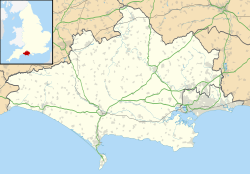| Portland Castle | |
|---|---|
| Dorset, England | |
 The entrance to the outer courtyard | |
| Coordinates | 50°34′06″N 02°26′48″W / 50.56833°N 2.44667°W |
| Type | Device Fort |
| Site information | |
| Owner | English Heritage |
| Open to the public | Yes |
| Condition | Intact |
| Site history | |
| Built | 1539–41 |
| In use | 1949 |
| Materials | Portland stone |
| Events | English Civil War First Anglo-Dutch War |
| Official name | Portland Castle |
| Designated | 9 October 1981 |
| Reference no. | 1015326 |
Listed Building – Grade I | |
| Official name | Portland Castle |
| Designated | 17 May 1993 |
| Reference no. | 1205262 |
Portland Castle is an artillery fort constructed by Henry VIII on the Isle of Portland, Dorset, between 1539 and 1541. It formed part of the King's Device programme to protect against invasion from France and the Holy Roman Empire, and defended the Portland Roads anchorage. The fan-shaped castle was built from Portland stone, with a curved central tower and a gun battery, flanked by two angular wings. Shortly after its construction it was armed with eleven artillery pieces, intended for use against enemy shipping, operating in partnership with its sister castle of Sandsfoot on the other side of the anchorage. During the English Civil War, Portland was taken by the Royalist supporters of King Charles I, and then survived two sieges before finally surrendering to Parliament in 1646.
Portland continued to be used as a fort until the end of the Napoleonic Wars in 1815, when it was converted into a private house. Fresh concerns over invasion led to the War Office taking it over once again in 1869, but the castle was not rearmed and was instead formed as accommodation for more modern neighbouring fortifications. During the First and Second World Wars it was used as offices, accommodation and as an ordnance store. In 1949, the War Office relinquished control, and in 1955 it was opened to the public by the state. In the 21st century it is managed by English Heritage and operated as a tourist attraction, receiving 22,207 visitors in 2010. Historic England consider the castle to form "one of the best preserved and best known examples" of King Henry's forts.[1]
- ^ "List entry", Historic England
